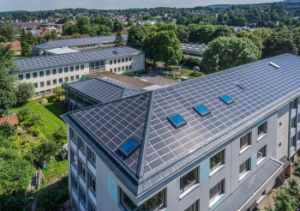KYOCERA SOLAR PANELS PROVIDE POWER FOR FORWARD-LOOKING PILOT PROJECT AT VOCATIONAL COLLEGE IN DETMOLD
The German Federal Ministry of Economics and Technology’s (BMWi) research project “Energy-Optimised Construction (ENOB)” gains recognition across Europe and opts for the Japanese technology group’s long-lasting quality
07 August 2014
Kyoto / Neuss − The modernization of the vocational college in Detmold, with a total investment of 7.8 million euros, is currently one of the largest and most important pilot projects for refurbishing school buildings. Equipping the roofs with 2,658 Kyocera solar modules with an output of 380 kWp not only means that the college will save 148 tons of CO2 annually, but will also generate more energy than it consumes, making the school an energy-plus building.
There are currently only four buildings of this kind throughout the whole of Germany. The vocational college in Detmold, however, sets itself apart from the other buildings on account of the fact that the aim of refurbishment is to improve energy efficiency by a factor of four: In the course of the project, which is scheduled for completion by the end of 2014, the buildings will be transformed into energy-efficient passive constructions; the environmental quality of the materials used ensures that the amount of so-called “gray energy” is significantly reduced while the primary energy factor for district heating is zero.
The energy savings potential of the renovation concept has also caused a stir within the trade throughout Europe: the project is aiming for a 93 percent reduction in heating energy consumption and 50 percent of electricity consumption for the 3,800 students. The target for reducing total energy consumption for heating, water and lighting is 70 percent. Overall, this equates to a reduction in consumption of 1.75 million kWh to 0.51 million kWh. Moreover, the surplus power that will be fed into the grid is expected to yield 250,000 euros after about 21 years of operation.
“The renovation of the vocational college in Detmold is one of the largest roof-integrated projects in Germany. The technical challenges associated with the project are extremely difficult. But thanks to the many years of experience with Kyocera’s high-quality solar modules, we were able to successfully complete this task,” explained Thomas Stork, managing director of Energetik Solartechnologie-Vertriebs GmbH, which is responsible for developing and installing the solar system.
“Kyocera solar modules have already been proven to be particularly powerful, durable and reliable in numerous tests. This is why the pilot project at the vocational college in Detmold was the ideal opportunity for us to make a lasting contribution to making educational institutions energy-efficient,” stated Shigeru Koyama, European Head of Kyocera Fineceramics GmbH.
The BMWi has invested a total 1.74 million euros to promote energy modernization as a research project within its “Energy-Optimised Construction (EnOB)” program. Ostwestfalen-Lippe University is providing the scientific backing for the project. The renovation concept was just recently awarded the BMWi prize “School 2030 ‒ Learning with energy” in the category overall renovation concept as part of this year’s Berlin Energy Days.
For more information about Kyocera: www.kyocerasolar.eu
Press Material
- Press Release (pdf) (146.37 KB)
- Press Photo (jpg) (751.40 KB)


